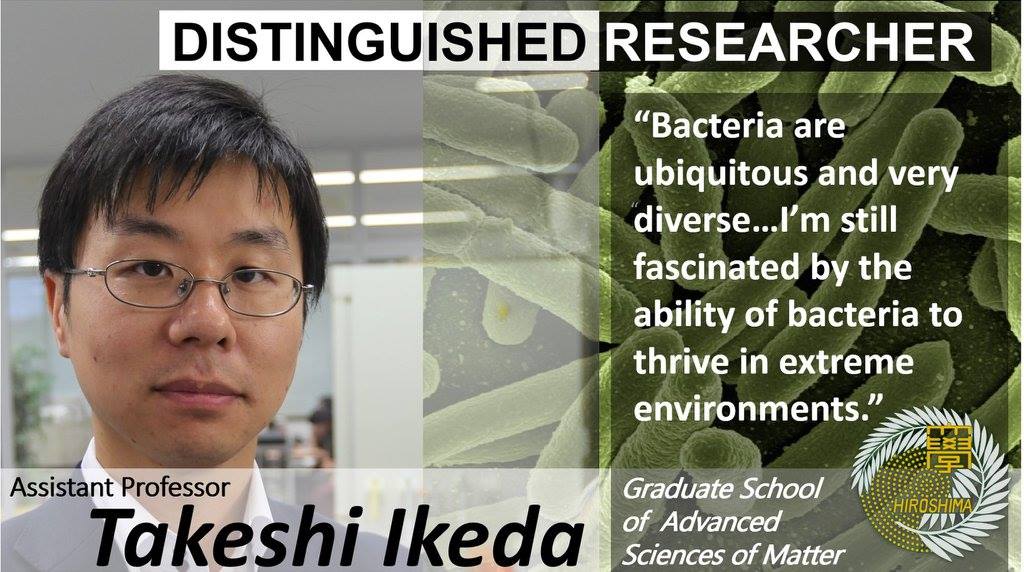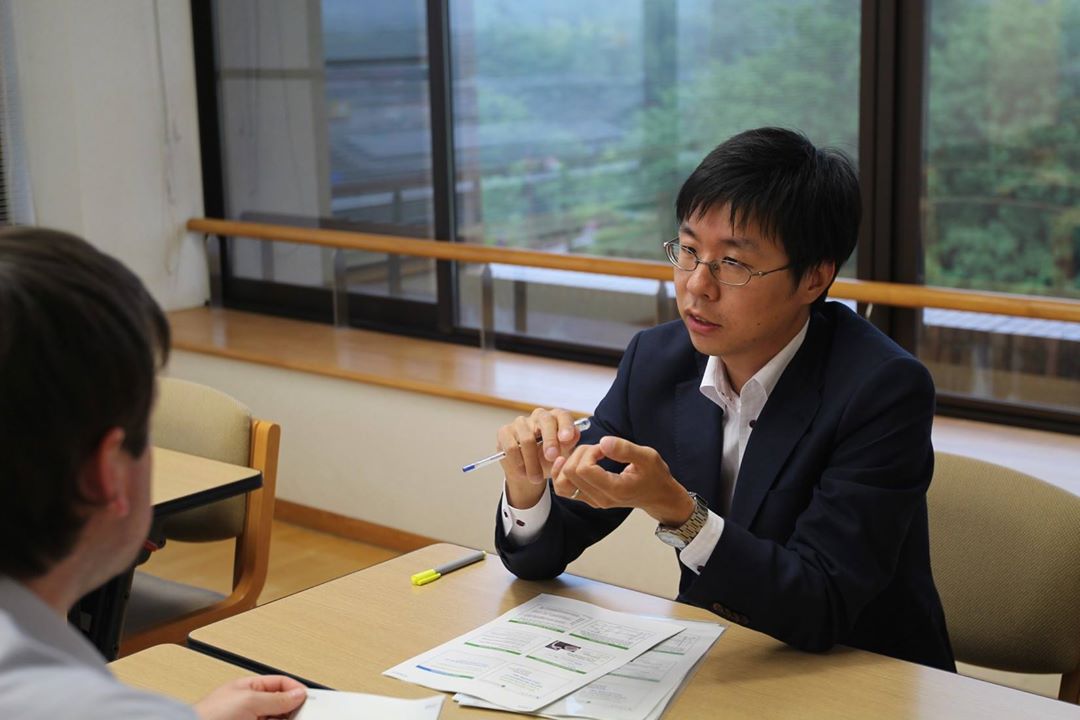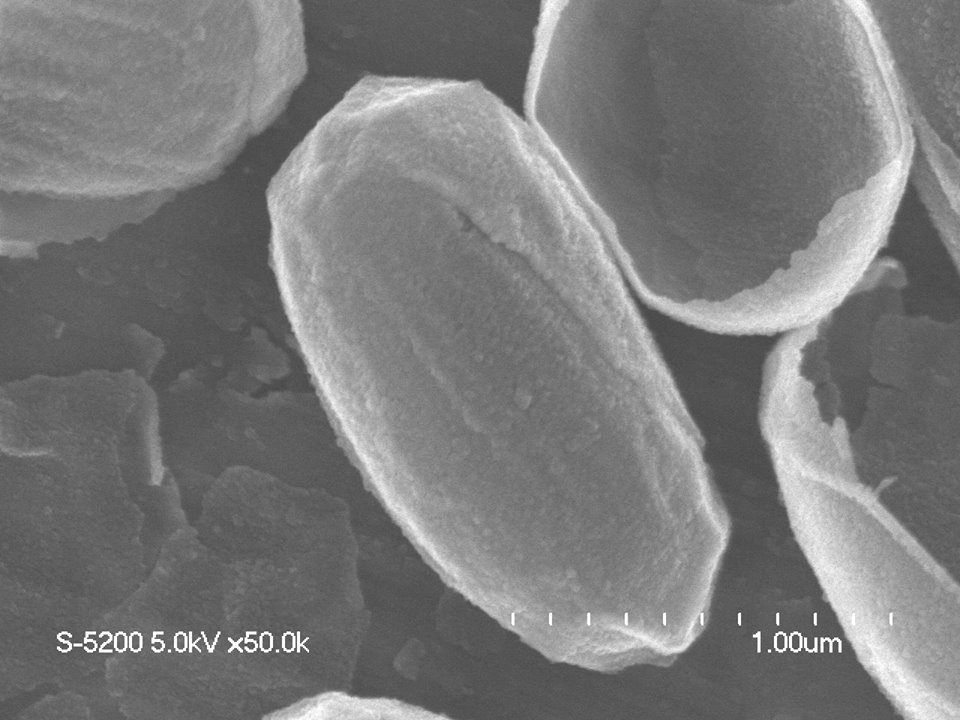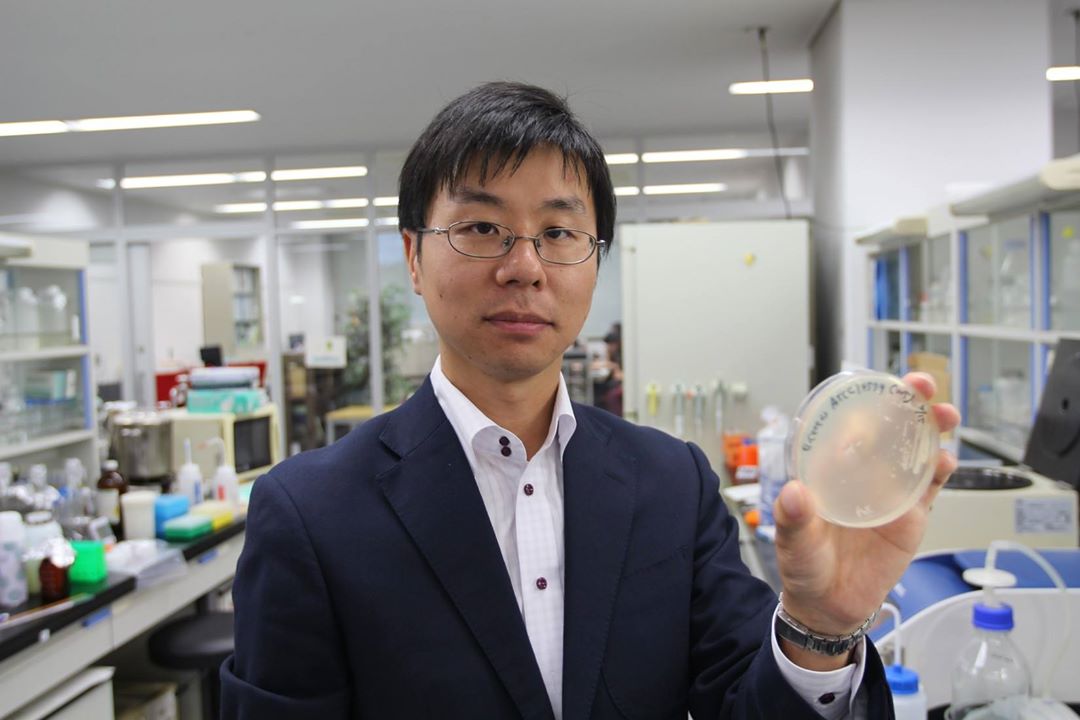On February 1, 2013, Hiroshima University established two new programs: the “Distinguished Professors” (DP) program and the “Distinguished Researchers” (DR) program. Individuals who are part of these programs are recognized as senior and junior faculty members respectively, who are engaged in extraordinarily distinguished research activities.
A Conversation with Distinguished Researcher Takeshi Ikeda

Can you tell me your name and specialty?
My name is Takeshi Ikeda. I study biomineralization– the process by which organisms produce inorganic materials. In particular, I focus on silica biomineralization in bacteria.
Silica, also known as silicon dioxide, and silicon in its pure form, is widely used in industry.But silica biomineralization has been intensively studied in diatoms, sponges, and higher plants – in bacteria, it was largely ignored until recently.
Although, in the 1960s some researchers did study silicon utilization by bacteria, when we tried to reproduce their results we were not successful. This led to our current quest to find bacteria that can synthesize silica. So far, we have already found some types of bacteria that form silica within the cell and we are investigating the mechanisms of this.
Why is silica important?
As I mentioned, silicon, formed from silica, and also silica itself, is widely used in industry. For example, pure silicon is used to produce semiconductor materials required for many applications including electrical transistors, detectors, and solar cells. Silica is also used as a drying agent, and in the food and pharmaceutical industries.
We are also interested in the proteins involved in silica biomineralization.Such proteins could potentially be used to integrate silicon with other biomolecules for the creation of new materials.We have found some proteins that bind to silicon surfaces, so we could conceivably immobilize such useful proteins. on silicon devices for a variety of purposes by using the proteins as an interface – for example, we are developing silicon-based biosensors.
What are biosensors?
Biosensors are analytical and diagnostic devices used for the detection of specific molecules. They are composed of a biological component and a physicochemical detector. The biological component is used to capture target molecules– most biomolecules, such as proteins, can recognize and bind to some other Type of molecules. We use silicon devices as the physicochemical detector that converts a molecular recognition event into a quantifiable signal.

By immobilizing proteins on a silicon device, we can construct such silicon-based biosensors.
Why do these specific bacteria strains produce silica – what is in it for them?
Biomineralization is the biological synthesis of inorganic materials at normal temperatures and pressure. The bacteria we study are close relatives of Bacillus subtilis – the same type used to produce Natto, (a traditional Japanese food made from fermented soybeans). This type of bacteria uses silica. They form a spore in the cell when deprived of nutrients, to protect themselves and to resist harsh environments. These bacteria encapsulate spores with silica, which further enhances their resistance to acid!

So as we can see [image right] this capsule is produced by bacteria – it has a very fine structure. The diameter is about 1 micrometer (one millionth of a meter) and the thickness is 10-20 nanometers (one billionth of a meter). Bacteria use silica as a hard capsule to protect their spores from their surrounding environment.
How did you end up working at Hiroshima University?
I graduated from my doctorate course at the University of Tokyo in 2007. Then, I moved to Hiroshima University as a post doc, before starting the research, which I am still working on. I have been at this university now for ten years.
Do you ever find yourself emotionally attached to the bacteria under your investigation?
Ha, I like bacteria. Bacteria are ubiquitous and very diverse. When I was a graduate student, I studied the metabolism of a bacterium isolated from a hot spring in Japan. This bacterium can grow happily at 70ºC– a very hot environment. It is also able to obtain energy by oxidizing hydrogen to synthesize organic compounds from CO2– this means we can grow it without the need for any organic materials. I’m still fascinated by bacteria’s ability to thrive in extreme environments.
As a child, did you imagine you would be working with bacteria in the future?
No! I was not thinking about the future as a child. I spent my days playing games and reading comics. It wasn’t until after I entered university that I got interested. After graduating from high school, I could not decide which topic I should study. I was not interested in engineering, or pharmacology, or medicine, so I kept looking for something interesting. At the University of Tokyo, we chose our specialized department in the second year – and that decision lead me here! I had no predetermined plan – it just sort of happened.
What do you like most about Hiroshima University?
I like the greenery, the natural surroundings. I like to walk around campus with my children at the weekends and assist in their bug safaris!
Any downsides?
I wish the students were more keen– more eager to study!
What are your thoughts on collaboration?
It's very important. My background is biology. I work with semiconductor scientists to construct silicon-based biosensors so collaboration is integral to what I do. To mix with researchers with different backgrounds keeps things interesting.

In five years' time what will you be doing?
I would like to continue investigating the mechanisms of bacterial biomineralization– and write good papers. I want to discover new enzymes or molecules involved in these processes.
Finally, will enzymes and bacteria become more important to society in the future?
The wide diversity of Enzymes are going to become ever more important for industry. They have the potential to convert molecules into other types, under normal pressure and conditions – and without producing pollutants. For a sustainable future, enzymes will definitely become much more important. bacteria makes them ideal sources of novel and useful enzymes.

Read more articles on Distinguished Professors / Researchers here
Read more stories from HU laboratories here
Written by Richard J. O'Connor (Hiroshima University Science Communication Fellow)
Find out more about Associate Professor Takeshi Ikeda, and how to contact him, here: http://seeds.office.hiroshima-u.ac.jp/profile/en.0aede6c0bbb35888520e17560c007669.html

 Home
Home